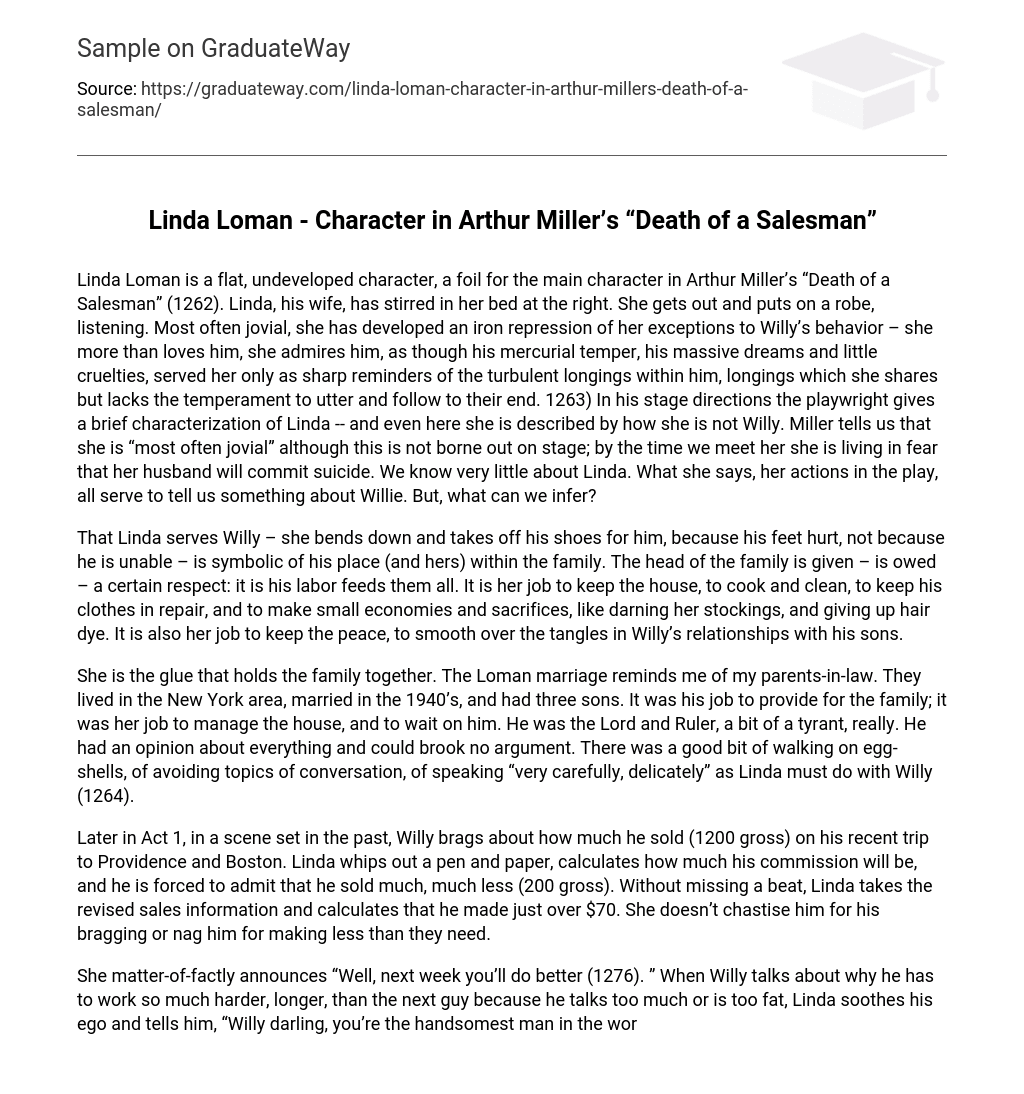Linda Loman is a flat, undeveloped character, a foil for the main character in Arthur Miller’s “Death of a Salesman” (1262). Linda, his wife, has stirred in her bed at the right. She gets out and puts on a robe, listening. Most often jovial, she has developed an iron repression of her exceptions to Willy’s behavior – she more than loves him, she admires him, as though his mercurial temper, his massive dreams and little cruelties, served her only as sharp reminders of the turbulent longings within him, longings which she shares but lacks the temperament to utter and follow to their end. 1263) In his stage directions the playwright gives a brief characterization of Linda — and even here she is described by how she is not Willy. Miller tells us that she is “most often jovial” although this is not borne out on stage; by the time we meet her she is living in fear that her husband will commit suicide. We know very little about Linda. What she says, her actions in the play, all serve to tell us something about Willie. But, what can we infer?
That Linda serves Willy – she bends down and takes off his shoes for him, because his feet hurt, not because he is unable – is symbolic of his place (and hers) within the family. The head of the family is given – is owed – a certain respect: it is his labor feeds them all. It is her job to keep the house, to cook and clean, to keep his clothes in repair, and to make small economies and sacrifices, like darning her stockings, and giving up hair dye. It is also her job to keep the peace, to smooth over the tangles in Willy’s relationships with his sons.
She is the glue that holds the family together. The Loman marriage reminds me of my parents-in-law. They lived in the New York area, married in the 1940’s, and had three sons. It was his job to provide for the family; it was her job to manage the house, and to wait on him. He was the Lord and Ruler, a bit of a tyrant, really. He had an opinion about everything and could brook no argument. There was a good bit of walking on egg-shells, of avoiding topics of conversation, of speaking “very carefully, delicately” as Linda must do with Willy (1264).
Later in Act 1, in a scene set in the past, Willy brags about how much he sold (1200 gross) on his recent trip to Providence and Boston. Linda whips out a pen and paper, calculates how much his commission will be, and he is forced to admit that he sold much, much less (200 gross). Without missing a beat, Linda takes the revised sales information and calculates that he made just over $70. She doesn’t chastise him for his bragging or nag him for making less than they need.
She matter-of-factly announces “Well, next week you’ll do better (1276). ” When Willy talks about why he has to work so much harder, longer, than the next guy because he talks too much or is too fat, Linda soothes his ego and tells him, “Willy darling, you’re the handsomest man in the world — . . . to me you are. (Slight pause. ) The handsomest (1277). ” Linda loves Willy; when he gets down on himself, she tries to builds him up. Willy’s suicide is the ultimate betrayal of his wife.
He decides to commit suicide to provide his son with a $20,000 stake while imagining how impressed Biff will be by the large turnout at his funeral. He has no thought for Linda or her grief. The play ends with her saying she is unable to cry: Forgive me dear. I can’t cry. I don’t know what it is, but I can’t cry. I don’t understand it. Why did you ever do that? Help me, Willy, I can’t cry. It seems to me that you’re just on another trip. I keep expecting you. Willy, dear, I can’t cry. Why did you do it? I search and search and I search, and I can’t understand it, Willy.
I made the last payment on the house today. Today dear. And there’ll be nobody home. (A sob rises in her throat. ) We’re free and clear. (Sobbing more fully, released. ) We’re free. We’re free… We’re free… (1331) Linda cannot understand her husband’s reason for suicide. It certainly was not for her comfort or safety. As she comes to the realization that she will be left alone in the house that is now free and clear, that she has been left without a partner to share this new freedom, she comes to tears and is able to cry.





